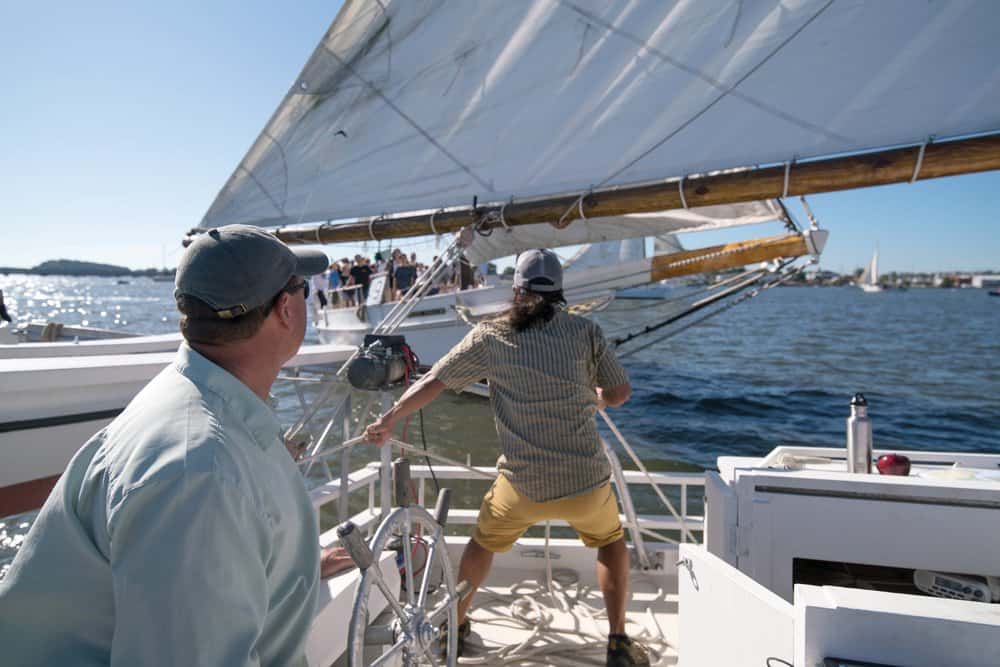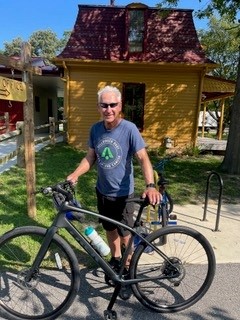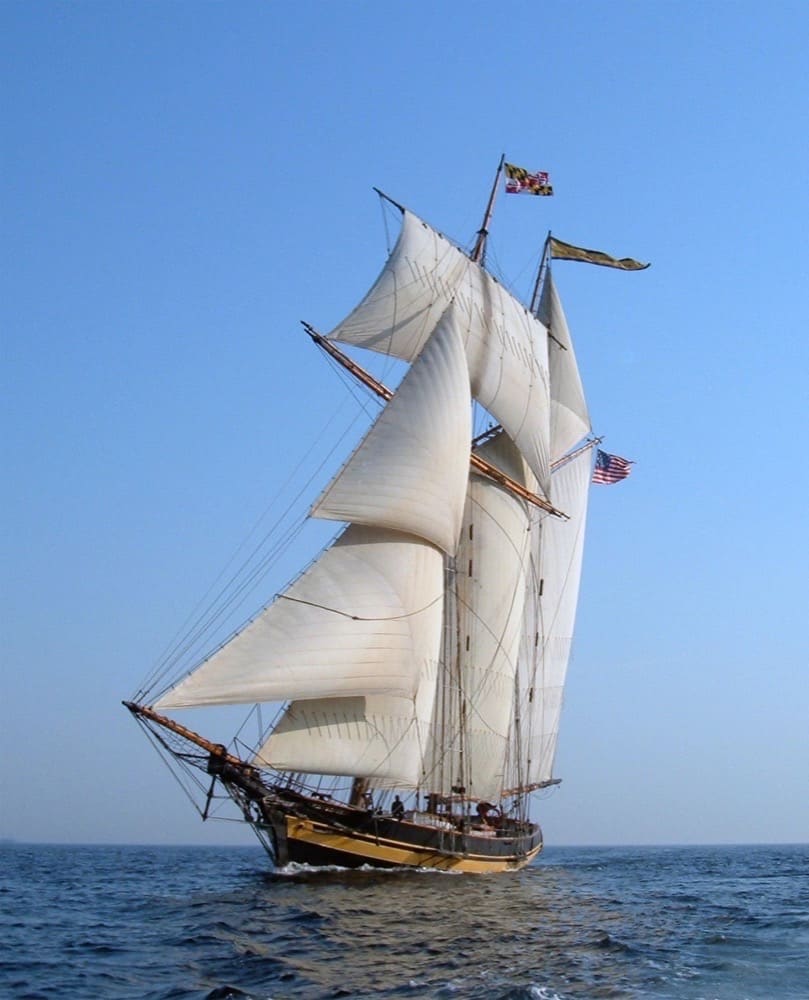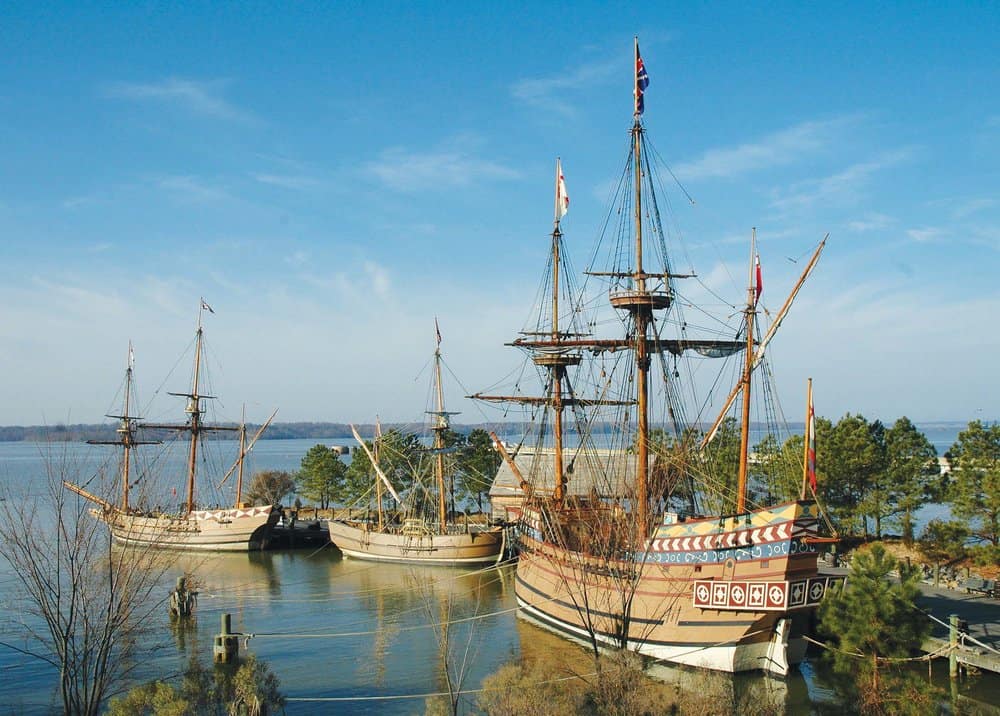photo by chris witzgall
A winning skipjack crew goes into the annual the Choptank River race against bigger boats, savvy captains, and ghosts they are ready to be rid of.
It’s a beautiful September morning on the Choptank with just the barest hint of a breeze making up, and the sun is keen enough already to pass the sunblock around and double check for the hat and shades. Along the wharf in Cambridge at Snappers Restaurant, the bright glassy water reflects the restless bowsprits of the skipjacks Ida May, Hilda M. Willing, and Rebecca T. Ruark, rafted-up side-by-side like racehorses in a starting gate, eyeing each other.
Captain Gordon Gladden, who owns the Ida May along with his brother Elbert Gladden, Jr., pushes a broom across her damp white deck, trying to corral the tufts of dew-wet grass carried aboard by crew on the boats that are rafted-up outboard of her.
“All those Tilghman Islanders brought that on there. Certainly not our group.” He’s joshing, of course (the Ida May is a Deal Islander), but he’s also keeping busy. The start of the 2017 Choptank Heritage Skipjack Race is in an hour or so. And there’s more than grass to sweep off this deck today. There are ghosts.
Four years ago at this race, the Ida May was on her way to a double header, having just won at Deal Island, and in the lead with the Rebecca T. Ruark hot on her heels, when a gust caught her broadside and with her mainsheet cleated. A hundred yards from the finish, the 107-year-old skipjack capsized like a log canoe, inexorably and with abrupt conviction.
Ten people went in with her, and Gordon dislocated his shoulder, although he says he doesn’t remember feeling it happen. Eventually, with the help of a couple of cranes and a small army, they righted her and pumped her out and limped her home. She’s raced since then—a second place here, a fifth there—but she hadn’t won again until just this fall, a couple of weeks ago at the Deal Island Labor Day race.
And maybe it’s that—the same setup as 2013, having just won their hometown regatta and coming into Cambridge for this race—that has everybody a little jumpy, the memory of the capsize on everybody’s minds and lips.
“I like being the forgotten underdog,” says Shawn Ridgley, Ida May’s strapping young skipper, who has been driving skipjacks and many other boats for years for the Chesapeake Bay Foundation, Living Classrooms Foundation, Annapolis Sailing School, and others. He joined the Ida May team a couple of years ago, after getting to know the Gladdens while taking CBF students to watch the skipjack’s five-year restoration in Chance, Maryland. Thrilled as he is to have helped the boat win the Deal Island race, Ridgley has enough regatta miles to know victory’s unintended consequence: “We’re not under the radar anymore.”
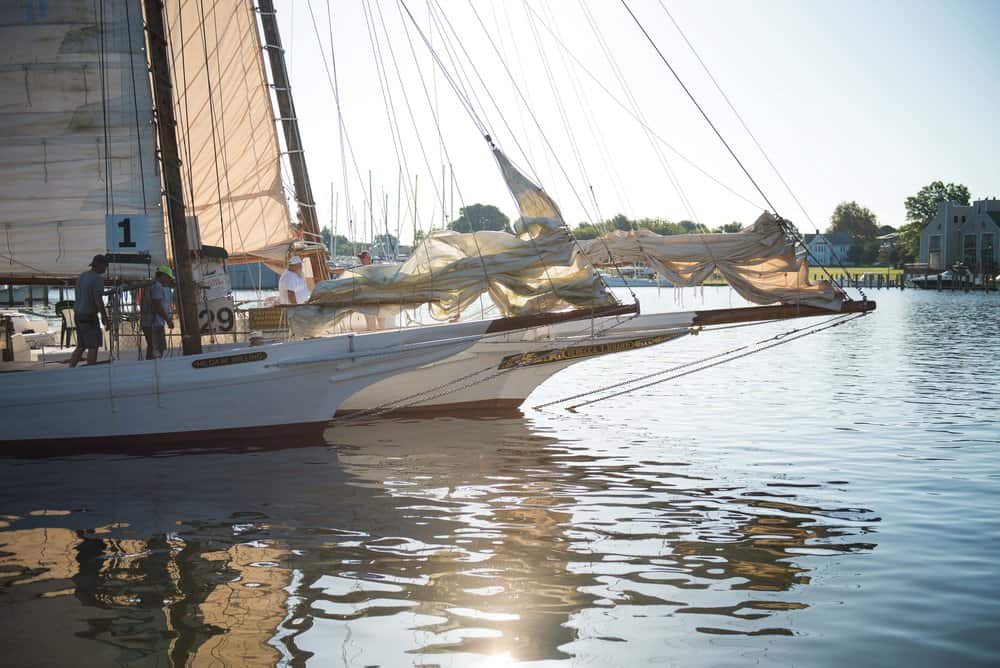 photo by joe evans
photo by joe evans
Nine boats are racing today—Ida May, Rebecca T. Ruark, Hilda M. Willing, Lady Katie, Nathan of Dorchester, Dee of St. Mary’s, Virginia W, Kathryn, and Rosie Parks. Of them, the Ida May is one of the smallest, at just 42 feet. Built in 1906 in Deep Creek, Virginia, she was purchased in 1954 by Gladden patriarch Elbert “Ebb-Tide” Gladden, Sr., who at one time owned and worked a fleet of 12 skipjacks, a bugeye, and various other traditional craft, all over the Bay but based out of the family home in Chance.
As evidenced by the capsize, she’s a tender boat (“almost like log-canoe racing,” Shawn says), and after the accident, the Gladdens added a thousand pounds of sand to help stabilize her. Unlike the bigger, brawnier boats in the fleet, she loves light air, and everyone aboard today is hopeful, for the forecast is for little more than 5-10 from the north—what the crew call “an Ida May day.”
And heading out of the creek and into the river, it’s looking good. By 9:30 the yawl boat is up, and the crew gets a nice bit of loosening up when Mike Oh, Shawn’s tactician, mainsail trimmer, and an experienced log-canoe sailor, loses his lid, requiring a well-executed hat-overboard drill.
The two of them—Mike and Shawn—quietly strategize the start, checking tide, current, breeze, and the line, as the skipjacks begin the starting sequence dance. Trusting their afterguard’s skill, Gordon and his brother Elbert eye the situation from a pair of camp chairs at mid-deck, while the other members of the crew take various positions. Despite the laid-back vibe, attention is sharp. No one here is along just for the ride, except maybe for me.
If you have an idea in your head of what a skipjack captain looks like—if you have fallen victim to that iconic stereotype, wrinkled, weather-beaten, hard and sharp-edged as an oyster shell—Gordon and Elbert will quickly disabuse you of it. Friendly, funny, and articulate, they are only too happy to talk about the family history and this boat’s role in it, as well as today’s competition.
“That’s the winningest captain on the Bay right now, Wadey Murphy,” Gordon says, as the 47-foot Rebecca T. Ruark rumbles by. “We learned a couple of years ago the rules don’t get in his way.” Shawn concurs.
“Those guys make me nervous, I’m not going to lie,” he says. “We’ve seen them hit other boats.” Yet he can’t hide admiration for his adversary, either: “He knows exactly what he’s doing. That boat is a part of him.”
“He has a lot of sail up,” Mike says. “His jib is as big as our main.”
“He can gift-wrap us with that sail,”Shawn agrees.
“I don’t know,” says Megan Fenoglietto, Ida May’s jib trimmer, whose father helped rebuild her and typically sails but is in Tampa right now. An eighth-grade science teacher at the Stephen Decatur Middle School, she’s a regular crew and is quick to defend Ida May’s honor. “This little boat sticks up for herself pretty well.”
At the start, though, it’s not the Rebecca T. Ruark who tangles with the Ida May, but the Rosie Parks. Crossing the start, Cool Hand Shawn steers the Ida May up from under the Rosie Parks, lifting up and over her with a foot to spare and squeezing past the Lady Katie close enough to step deck-to-deck. With a nice bit of momentum and Shawn’s gentle handle on the wheel, Ida May squirts like a watermelon seed between the two and is first over the line, clean and clear.
“Threaded that needle,” says David Gladden, Gordon’s son, who has raced the boat since he was a boy and now teaches news media art at Salisbury University. Shawn and Mike do a subtle fist-bump, and all seems perfect until the Rosie turns beneath us, trying to tack away but misjudging the distance. Her bowsprit rakes down half the length of the Ida May’s boom, which shudders—pop, pop, pop!—as the bowsprit hits each ridge of the footline attaching the mainsail to the boom. Then it sweeps over the rail before pulling clear, barely missing Elbert, who doesn’t even flinch.
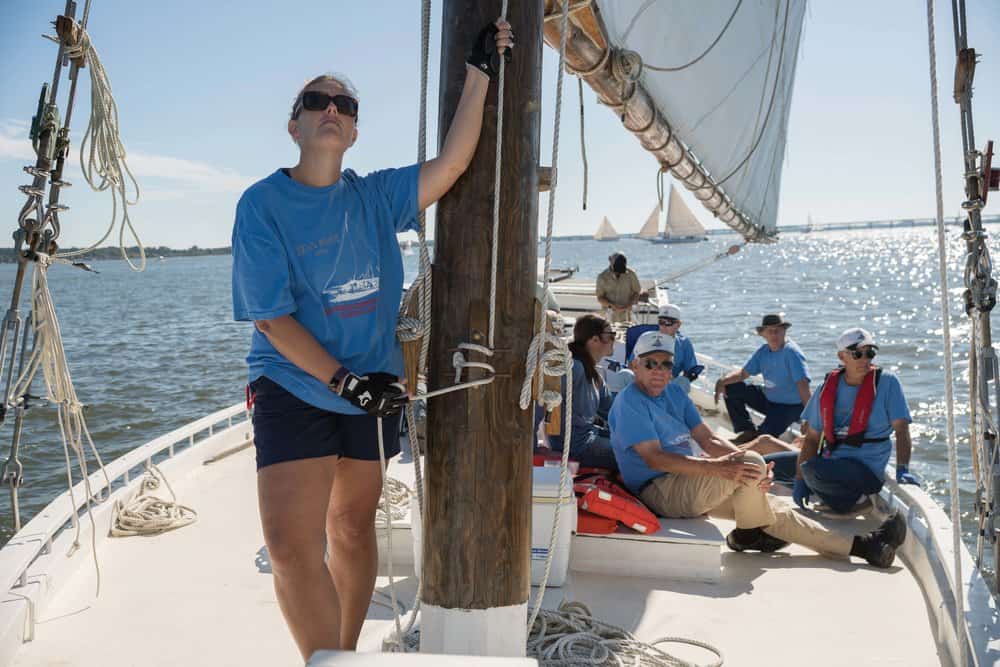 Megan Fenoglietto eyes Ida May ’s jib. Photo by chris witzgall.
Megan Fenoglietto eyes Ida May ’s jib. Photo by chris witzgall.
“You wanna know why I’m not the captain?” laughs Gordon. “She wouldn’t sail!”
Amid the relieved laughter and comments about “rubbin’s racin’ ’’, Shawn calls for people to leeward.
“Let’s get some weight down there,” he says, “let her feel it.” Immediately the boat leans into the wind. “Yeah, that’s it,” he says.
Slowly but surely, Ida May begins to sail her race. Unencumbered now by any other boats nearby, she glides like a moth across the surface of the river. Quietly, Shawn and Mike confer aft, calling for a tack now and then—joking about roll tacking—and everyone’s movements seem to match the quiet steadiness of the breeze, which has built as advertised to eight-to-10 knots, but no more.
“Oh, that breeze feels good,” Gordon says.
“Beautiful day,” Elbert agrees. “It’s a beautiful day, no matter what.”
But while the Ida May is rolling comfortably toward the turning mark, well ahead of everyone, the Rebecca T. Ruark is still in the hunt, and no one takes their eyes off of her for long. Below us, Captain Wade is making a beeline for the mark, hoping the current and maybe a lifted breeze will carry him up and over the layline so he won’t have to lose ground tacking to make it. The merits of this tactic take over the conversation onboard the Ida May for many minutes, as everyone watches and wonders if the Rebecca will be able to maintain enough momentum while pinching so high.
“If he can lay the mark, he’s got us,” Shawn says.
“Is he going to make it? Megan asks.
“He might, he’s pushing it,” David says. “Oh, this is going to interesting. Can he make it?”
As it turns out, he can’t, but when Wade puts the helm over and tacks the Rebecca, he’s only three boatlengths from the Ida May, which in the context of these two boats is neck-and-neck. No one else is challenging.
Rounding the weather mark first, Shawn immediately adopts dinghy tactics, bringing up the Ida May’s centerboard and skimming her in the shallowest water he dares, out of the current that’s ebbing stronger in the deeper water.
“I just want to get far enough ahead of those big boats that they can’t blanket us with those big sails,” he says.
Keith Whitelock, a Salisbury artist and Ida May regular who’s “sketched and drawn this boat my entire life,” poles out the jib with the long wooden boathook.
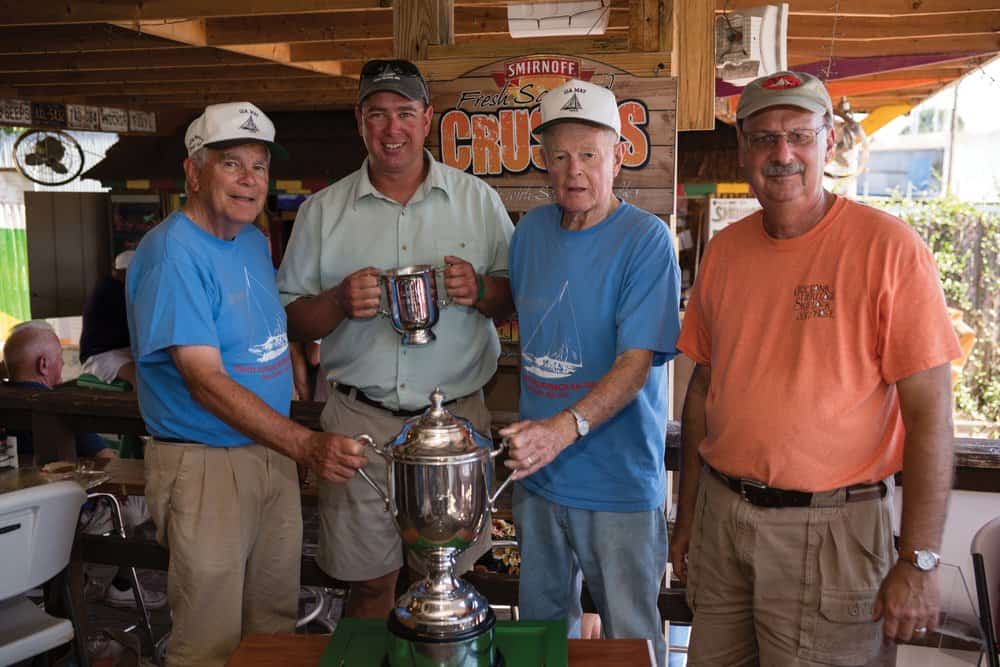 Ida May ’s captain and owners receive their trophies from Race Chairman Lou Hindman (right).
Ida May ’s captain and owners receive their trophies from Race Chairman Lou Hindman (right).
“Wadey never gives up,” Gordon says from his deck chair. “His goal in life is to get your wind and he’s got the sails to do it.”
“And he’s got waterline.” Shawn notes—meaning that with a longer waterline than the Ida May, the Rebecca is automatically eating more distance. As we ghost along the edge of the Hambrooks Bar, a little more breeze nudges the sails, and everyone glances aft worriedly, waiting to see the bigger Rebecca bringing the wind to us and overtaking. But it never happens. The Ida May stretches her lead.
Yet, as she comes abreast of the town, closing with the finish, Gordon looks warily over at the buildings on shore. With the finish only a few hundred yards away, it’s not the bigger sails, waterline length, or savvy captain of the Rebecca T. Ruark the crew of the Ida May is racing anymore.
“In Tangier Sound, we don’t get those kinds of gusts,” he says. “You can see the wind coming across the water. Here, the land is right here. We couldn’t see it coming.”
“Do you know, I never even got wet,” Elbert says thoughtfully. “I climbed right up on that cabin and sat up there.”
“It happened so fast,” Gordon says. “Boom, boom! There wasn’t anything we could do.”
“One good thing, it rained life jackets!” someone says, as the memory takes over and the story requires its re-telling from the many voices who lived it and who can’t forget it.
But there is no repeat of 2013, as the Ida May crosses the finish, finally claiming the back-to-back wins she was so close to achieving four years ago, finally vanquishing the ghost.
“Captain Shawn of the Ida May is passing by!” Gordon calls up to the committee boat. And as the horn sounds the win, he leans over and gives Shawn a huge hug and the crew cheers their tender, venerable, quick little skipjack, celebrating the sweet splendor of an Ida May day.

